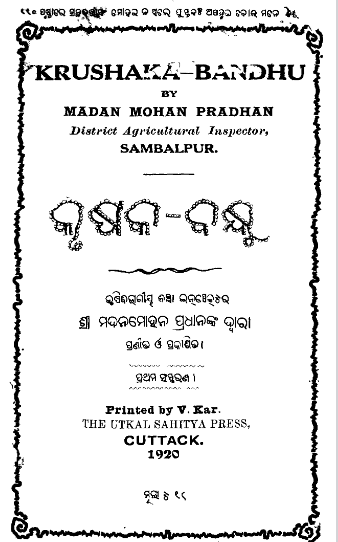Krusaka Bandhu, published in 1920 by Madana Mohana Pradhan, stands as a significant contribution to Odia literature, particularly in the realm of essays. This book provides a profound exploration of the agrarian lifestyle in Odisha, representing the voice of the farmer and their struggles while affectionately portraying the rural landscape and its inhabitants. As one of the early literary works centered on agricultural themes, it remains poignant in its insights, serving as both a historical document and a literary masterpiece.
The publication of Krusaka Bandhu came during a crucial period in Indian history when the agrarian community faced numerous challenges. The British colonial regime had a considerable impact on agricultural practices and land ownership, leading to unrest amongst the peasantry. Against this backdrop, Pradhan’s essays resonate deeply, as they touch upon the socio-economic issues of the time, while offering a lens into the daily lives of farmers. His work highlights the resilience of the farming community and seeks to elevate their voice, which had often been marginalized.
At the heart of Krusaka Bandhu is a celebration of rural life. Pradhan employs an evocative narrative style to paint vivid images of the Odisha countryside, describing its lush green fields, the rhythm of the seasons, and the close-knit relationships within village communities. He illustrates the deep connection between the land and its cultivators, portraying agriculture not merely as a means of livelihood but as a way of life intertwined with culture, tradition, and spirituality.
The essays are not just descriptive; they also delve into the philosophical aspects of farming. Pradhan reflects on the farmer’s labor, portraying it as a noble and dignified pursuit. He emphasizes the virtues of hard work, patience, and perseverance, often drawing analogies between agricultural processes and life’s broader struggles. The recurring motif of sowing and reaping serves as a metaphor for personal and collective growth, urging readers to appreciate the fruits of labor in every aspect of life.
Moreover, Pradhan addresses the social injustices faced by farmers, including exploitative land tenure systems and insufficient support from the government. His essays appeal for greater awareness and advocacy for the rights of farmers, positioning Krusaka Bandhu as not just a literary work, but also a social commentary that resonates with contemporary readers who still witness similar challenges in rural India.
Pradhan’s writing is characterized by its simplicity and authenticity, making it accessible to a wide range of readers. His use of the Odia language enriches the text and reflects the cultural nuances of the region. Through his compelling storytelling, he evokes a sense of nostalgia for rural life while also instilling a sense of responsibility toward the agrarian community.
Conclusion
Books Info
| Books name | Krusaka Bandhu / କୃଷକ ବନ୍ଧୁ |
| Author | Madana Mohana Pradhan |
| No Of pages | 136 |
| Publisher | Madana Mohana Pradhan |
| Publication | 1920 |
| Printed At | The Cuttack Sahitya Press |
| Distributor | NA |

